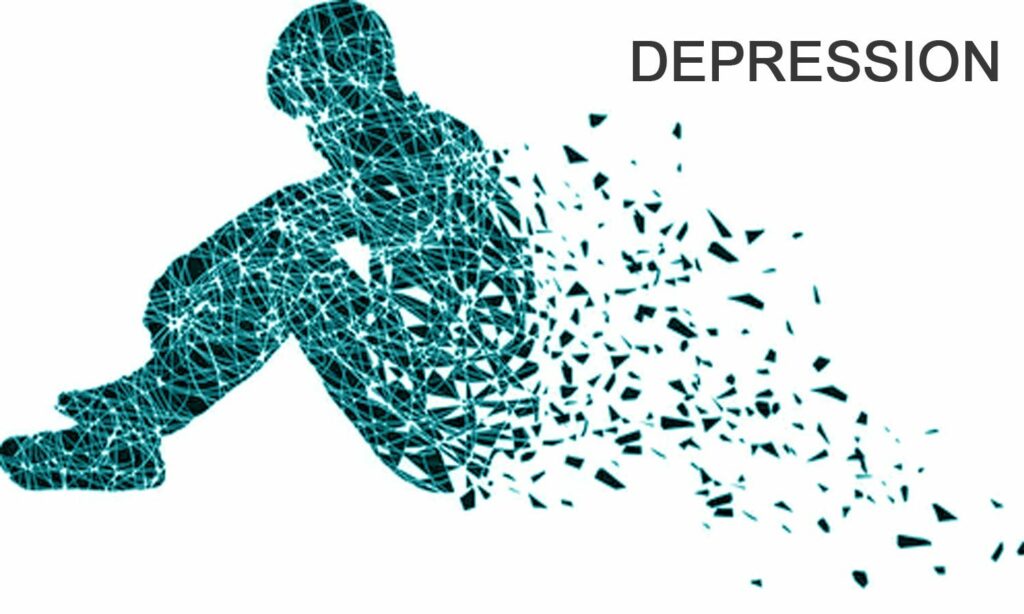Depression is a mental disorder that is characterized by feelings of sadness, despair, and hopelessness. It can caused by a variety of factors, including genetic predisposition, chemical imbalances, traumatic life events, and medication side effects.
DSM-5 depression criteria is the most current classification of mental disorders. This depression criteria was published in 2013 and includes new and updated diagnostic criteria for a variety of mental disorders, including depression.
Depression can lead to several negative consequences in both the short-term and long-term, including relationship problems, job loss or career stagnation, substance abuse, and suicide. To diagnosed with depr ession, you must meet certain criteria as outlined in the DSM-5 depression manual. This blog post will provide an overview of DSM-5 depression criteria and we’ll explain what this mean.
Contents
What Is Depression?
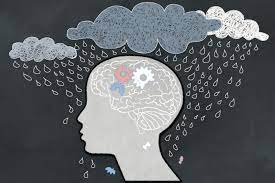
Depression is a mood disorder that causes a persistent feeling of sadness and loss of interest. It can lead to a range of emotional and physical problems. Depression is a common mental disorder. According to the World Health Organization, it is the leading cause of disability worldwide.
Those who suffer from depression may experience one or more of the following symptoms:
- Persistent sad, anxious, or “empty” mood
- Feelings of guilt, worthlessness, or helplessness
- Loss of interest or pleasure in activities once enjoyed
- Difficulty concentrating, remembering details, or making decisions
- Insomnia, early-morning awakening, or excessive sleeping
- Appetite changes resulting in weight loss or gain
What Is DSM-5 Depression Criteria?
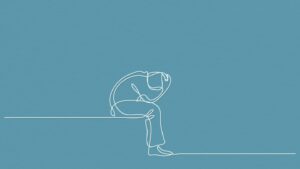
- The DSM-5 has multiple criteria for depression, but the key symptoms are a depressed mood and loss of interest in activities. Other symptoms may include changes in appetite or weight, sleep disturbances, fatigue, feelings of worthlessness or guilt, difficulty concentrating, and thoughts of suicide.
- The DSM-5 defines the major depressive disorder as experiencing five or more of these symptoms for at least two weeks.
- To be diagnosed with major depressive disorder, the person must also experience significant impairment in their ability to function normally at work, school, or home. For example, they may have trouble sleeping so they can’t concentrate well at work, lose their appetite so they can’t eat properly and become very thin, or become so fatigued that they can’t participate in normal activities.
- Other conditions can cause similar symptoms to depression, so a mental health professional will perform a comprehensive evaluation to make sure that the person meets the diagnostic criteria for major depressive disorder.
- If you think you may experiencing depression, talk to your doctor or mental health professional. There are many effective treatments available, so there is no need to suffer in silence.
Symptoms of Depression in DSM-5
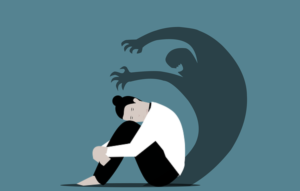
The DSM defines major depressive disorder, or MDD, as a mental disorder characterized by the presence of one or more major depressive episodes. A major depressive episode is defined as a period of at least two weeks during which you experience five or more of the following symptoms:
- Depressed mood most of the day, nearly every day
- Diminished interest or pleasure in all, or almost all, activities most of the day, nearly every day
- Significant weight loss when not dieting or weight gain (a change of more than five percent of body weight in a month)
- Insomnia (inability to sleep) or hypersomnia (excessive sleeping)
- Psychomotor agitation (restlessness) or retardation (slowed movements and speech)
- Fatigue or loss of energy
- Feelings of worthlessness or excessive guilt
- Recurrent thoughts of death, suicide, or wishing oneself dead
The symptoms must cause clinically significant distress or impairment in social, occupational, or other important areas of functioning. The DSM-5 requires five of the nine symptoms to present during the same two-week period. The diagnosis is made if the symptoms are not due to a medical condition, medication use, substance abuse, or another mental disorder.
Major depressive disorder can occur at any age, but it is most common in adults. It affects women more often than men. Symptoms can vary from person to person, and some people may experience only a few symptoms, while others may experience many.
How Is Depression Different From Sadness in DSM-5?
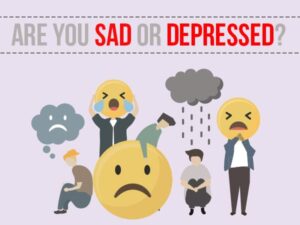
- The difference between depression and sadness is that depression is a mental illness while sadness is a natural emotion.
- Depression is a mood disorder that causes feelings of extreme sadness, despair, and hopelessness that interfere with daily activities. Sadness is an emotional response to events that are typically sad, such as the death of a loved one.
- A person going through depression feels sad and hopeless about the future for weeks or months at a time, while someone who is sad may feel upset for a day or two and then return to their usual mood.
- Depression also includes symptoms such as changes in appetite, sleep disturbances, loss of interest in activities, and feelings of guilt and worthlessness.
- Sadness is a normal reaction to difficult situations, while depression is a mental illness that requires treatment. If you are feeling sad for more than two weeks and your mood is impacting your daily life, it’s important to see a doctor and discuss whether you could suffer from depression.
How To Reduce Depression?

There are many ways that people can reduce their risk of developing depression. Some of these include:
Doing Regular Exercise
Doing regular exercise can prevent you from developing depression. Exercise releases endorphins, which have mood-boosting effects.
Eating Healthy Diet
A balanced and healthy diet is key in maintaining your mental health and preventing depression. Eating foods that are high in Omega- fatty acids, such as salmon or walnuts, can help improve your mood.
Staying Connected With Friends and Family
It’s important to have a strong support system when you’re struggling with depression. Spending time with loved ones can help make you feel supported and loved.
Practicing Mindfulness Meditation
Mindfulness meditation can help manage depressive symptoms. It teaches you how to focus on the present moment and accept all of your thoughts and feelings without judgment.
Spending Time with Friends and Family
It’s important to have a strong support system when you’re struggling with depression. Spending time with loved ones can help make you feel supported and loved.
Trying Cognitive Behavioral Therapy
Cognitive-behavioral therapy is a type of therapy that helps you identify and change the negative thoughts that contribute to your depression. It can be an effective treatment for mild to moderate cases of depression.
Taking Antidepressants
If your depression is severe, your doctor may prescribe antidepressants. There are many different types of antidepressants, so it’s important to work with your doctor to find the one that’s best for you.
Conclusion
In conclusion, depression is a serious mental illness that requires treatment. The new DSM-5 diagnostic criteria for depression are more broadly defined, and they include a wider range of symptoms.
The depression criteria for depression are also more inclusive, and they can be used to diagnose both major depressive disorder and persistent depressive disorder. The new criteria for depression are also more flexible, and they can be used to diagnose people who do not meet the full criteria for major depressive disorder or persistent depressive disorder.
If you think you may be suffering from depression, please consult with a mental health professional. There is no shame in seeking help, and treatment can make a big difference in your life. Thanks for reading!
A Word From Therapy Mantra
Your mental health — Your psychological, emotional, and social well-being — has an impact on every aspect of your life. Positive mental health essentially allows you to effectively deal with life’s everyday challenges.
At TherapyMantra, we have a team of therapists who provide affordable online therapy to assist you with issues such as depression, anxiety, stress, workplace Issues, addiction, relationship, OCD, LGBTQ, and PTSD. You can book a free therapy or download our free Android or iOS app.
